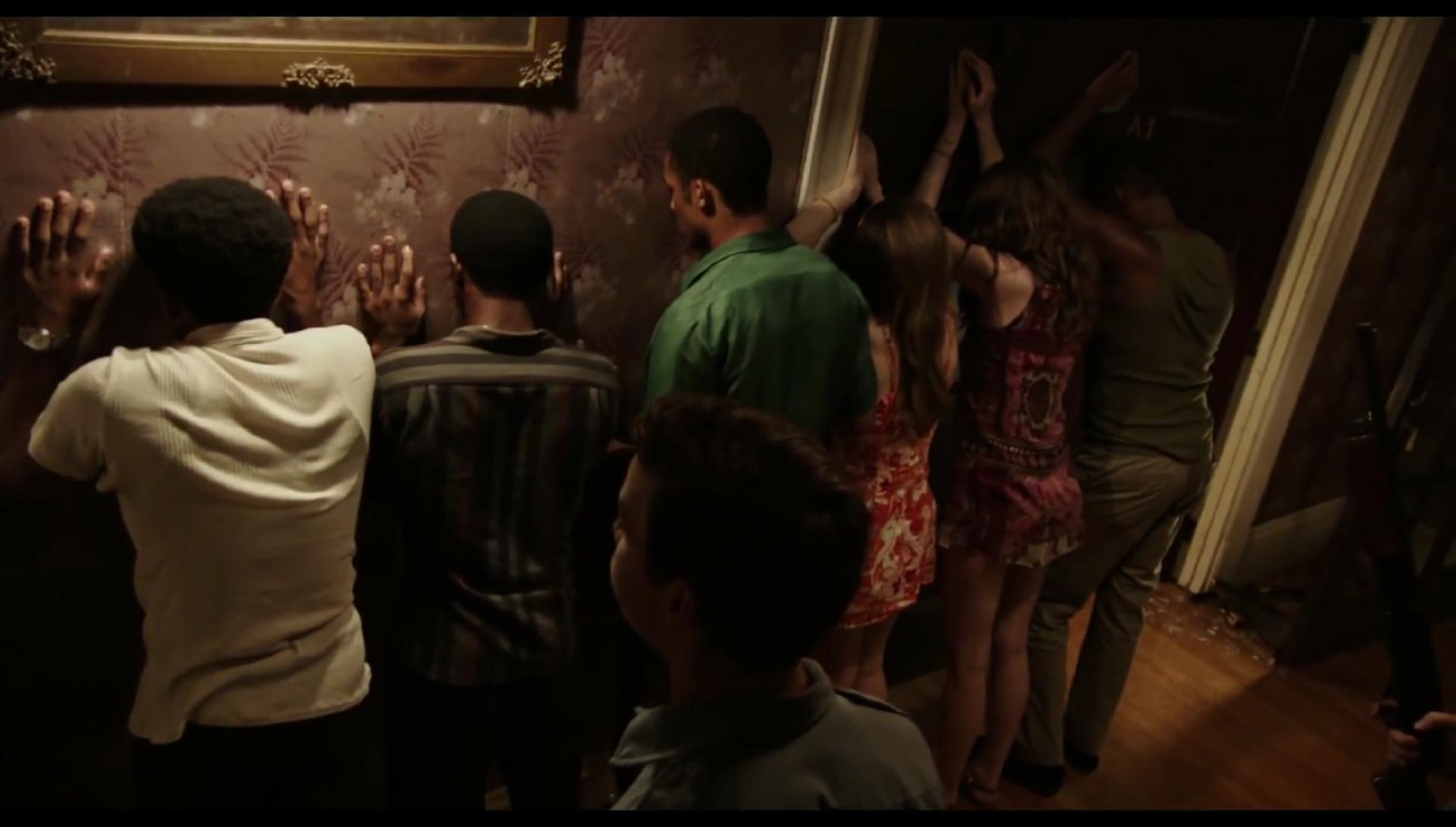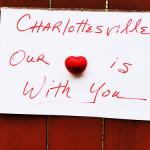I saw the film Detroit (directed by Kathryn Bigelow) this weekend. I left the theatre shaken, grieving what a violent, bloodthirsty country America is and always has been and grieving the continued cries of the oppressed for justice.
The film is based around an incident that occurred at the Algiers Motel during the 1967 conflict between police and black citizens in Detroit. (White people tend to call this five-day episode “the riots,” while the black community–and this film–tends to call it “the rebellion.” I will try to use the value-judgment-free term “the conflict.”)
Framed by Historical Context
The story is framed by its historical context, in a section written by historian Henry Louis Gates Jr. that introduces the film. Using title cards with the paintings of Jacob Lawrence (The Great Migration), we quickly get caught up on history: After World War I, blacks migrated north in hopes of a better future away from the South. After World War II, white flight occurred, with white people moving to areas with other white people–and away from black people. Black Americans were increasingly shut out of the promise of the American Dream. As tensions rose, conflicts began to occur in the 1960s, all around the country. In Detroit, black folks were restricted to a few overcrowded neighborhoods with white policemen, rather than black policemen from their own community. (Furthermore, there was plenty of abuse of the black population by police.) Setting up these historical tensions, the film helps us understand how the raid of an unlicensed nightclub, the Blind Pig, was the catalyst–but the conflict was about more than that one raid.
The chaos that begins to erupt in Detroit is extreme. And the film unflinchingly shows us that, yes, during the conflict black people did sometimes destroy businesses in their own neighborhoods and therefore did sometimes hurt their own people. They also sometimes attacked firefighters, which seems so counterproductive and awful. I appreciate that Bigelow is honest about police abuse (devastatingly so), but also refuses to engage in the hagiographic filmmaking that has so often tripped up social issue filmmaking before. Her well-rounded storytelling strengthens her case against police brutality, because you feel you is being a truthful arbitrator of facts.
One character in the film tellingly reminds us that the rebellion against the British by our country’s founders got kind of out of control too (Boston Tea Party, anyone? Tarring and feathering, anyone?). And yet those white men are idolized rather than villainized. The film doesn’t justify the destruction that occurred (in either case), especially against the black community itself, but it helps us empathize with how desperate black men felt in 1967 in Detroit.
In the larger chaos that swirls through the city, we come to meet a few key characters whose paths will intersect at the Algiers Motel one hot summer night. We meet the members of a (very young) soul group called The Dramatics, who end up at the Algiers on the way home from an interrupted performance. Key among the characters of this group are Larry (Algee Smith) and Fred (Jacob Latimore) (the latter of whom ends up dead). We also meet Melvin Dismukes (John Boyega), a hardworking, part-time black security guard.
And we meet a group of young policemen, as they drive in an unmarked car through the ruins of burned-out neighborhoods during the conflict. The way the beginning of the scene is shot (from the head up), we don’t initially realize they are police; we think they may simply be white young men (maybe liberal college students?) checking out what is going on in the city. We also initially think they may be principled; one says, “We have to stop failing these people.” Nice sentiment, right? Except we realize moments later that these words come out of a terrible paternalism. As we zoom out and realize they are police officers, the camera and the men’s eyes zero in on a man who is looting. One of the policemen, a character named Krauss, who seems to align with real-life officer David Senak, chases the man down and shoots him in the back. The man eventually dies. Krauss is reprimanded by his superior officer, told murder charges will be recommended (after all, stealing is not a death sentence crime), and then is sent back out to patrol! This really occurred with Senak, as Slate’s Aisha Harris reports. (And Senak really did end up at the Algiers Motel as one of the perpetrators later.)
What occurred at the Algiers Motel was a night of psychological horror, beatings, and torture at the hands of police officers for a group of unarmed African-American young men and two white girls. And for three of the black men (Fred Temple, Aubrey Pollard, and Carl Cooper), it ended in their death. No police officers ever went to jail for this night of violence.
Recognizable White Supremacy
Krauss’s character is played with nuance by actor Will Poulter. Sadly, he comes across as an identifiable white person–that person you have met who posts ugly Facebook memes and makes offhand comments about “the blacks” when they think they will have a sympathetic ear. He is young and nervous and monstrous, but because he is recognizable, we are forced to confront the racist horrors within ourselves and our communities. I don’t mean that all of us would literally torture and kill black people (of course not), but I mean that I have heard from white lips before, from nice white people, many of the things he says and the way he justifies himself. And that’s more than a little disturbing. Because even if people who say these things would never do what Krauss does, their perpetuation of a white supremacy narrative (one in which blacks are viewed as inherently flawed and in need of white guidance, reform, or punishment) creates a dangerous society for black people. It creates a world in which black people don’t get the same individual presumption of innocence till proven guilty that the rest of us get.
And yet Krauss also denies his racism, even as he tortures and eventually murders young black men simply because he doesn’t trust black men. Simply because he believes as the face of “law and order,” he has a right to end their lives if he chooses. It boggles the mind when he says, “I got nothing against you people.” The paternalism of “we have to stop failing these people” moves to an ever more explicit white supremacy. Krauss declares his belief that most (if not all) of the black men he is holding hostage are deserving of his abuse because, after all, they are probably criminals anyway. (And yet, tellingly, he does not believe himself to deserve punishment for his gangster-like treatment of the population.) This is a white supremacy that assumes black people are damaged and in need of the “civilizing” of white people. And yet, the violence that explodes demonstrates who is truly uncivilized in this episode. In one particularly ironic moment, Krauss declares with moral aplomb, “If you think you can shoot at innocent people and get away with it, you’re dead wrong.” Well. Take a look at those four fingers pointing back at you, Officer Krauss.
Krauss’s character development made me wonder, why is it that white people are more afraid of being called racist than of being racist? Krauss is insistent that he is not racist. He’s one of the good guys, in his own mind. I’m not sure if Krauss would identify as a Christian, but his contradictions made me ask about those who would, Why do white Christian people, who claim to believe in original sin, try to wiggle out of charges of racism by claiming to have pure hearts? How can any sinner have a pure heart, especially one who lives in a society impacted by multigenerational oppression and racist views? It would be more shocking to find someone unaffected by racism in this country–even if they are a Christian–than to find the opposite. Furthermore, though we can never claim to read someone’s mind or peer into their heart, we can go by what Jesus told us: “By their fruits you shall know them.”
Well-Rounded Characters and Storytelling
The character of the black security guard, Dismukes, is also fascinating, and Boyega’s performance is well-rounded and sympathetic. Aisha Smith points out that the historical account of whether or not he participated in the torture of the young people is unclear. Some of the victims claim he did. The film takes the narrative angle that he did not but was blamed after the fact for what occurred, in order to get the white cops off the hook. While what actually occurred is unclear, even if we assumed he had participated, it’s possible he might have done so to protect the lives of the people gathered, however morally questionable such a tactic may be. When Variety interviewed him, Dismukes claimed Bigelow’s portrayal was very accurate in showing his experience of what occurred. He added, “I knew something was immediately wrong and not normal. The bodies and the abuse going on in the lobby. I just wanted to do what I could to try and cut down on some of the violence. I had seen the police act out of line before, but nothing like this.” He also said that he had hoped “to help people stay alive” through his presence.
In the film’s portrayal, Dismukes’s character tries to be “respectable” in order to fit in in a white world. He seems to be one who believes colorblindness and meritocracy is possible if you just don’t rock the boat. This results in him being called “Uncle Tom” by one black character. However, the abuse and violence that occurs in the Algiers Motel shake his view of the world, as does the aftermath. He survives the night but ends up blamed for the sins of the white cops. This narrative thread chillingly recalls the violence against Philando Castile, who seemed to do everything he was supposed to do and yet he was still killed by a police officer. The comfortable myth of the existence of a colorblind world is not a luxury black men can safely harbor.
Because Bigelow is not a one-note, preachy kind of storyteller, but rather one who shows us the messiness of life, she does not let us harbor the view that every single cop is a monster. Instead, she shows us that one of the bloodied survivors of that violent night is rescued by a kind cop. Yet she also does not flinch from the survivor’s reaction when the policeman approaches: one of fear. (This scene recalls for me the main character in the horror film Get Out, who responds similarly–in sharp contrast to the relief white people feel when the police pull up–he reacts with visceral fear.) The message seems to be that some cops are monsters (like Krauss and his compatriots) and some are enablers (such as the Michigan State Police and National Guard who, at least in the film, know what is going on and know that it is a violation of civil rights, but don’t want to rock the boat) and some are kind and honorable. (And some are nervous and scared and apt to react out of anxiety without a clear assessment of actual risk.) But all cause fear to rise in African-Americans, who have endured so much abuse by police in the past and who know that despite “respectable” black behavior, they may still face down the barrel of a police gun. The power of life and death is all in the hands of humans who may be vicious or enabling or kind or anxious. And unless you know the police officer personally, you have no idea which you are getting. That is terrifying.
Criticism of the Film
There has been some criticism, from black communities in particular, citing concerns that the film should not have been made by a white woman, and that black trauma was not her story to tell. So far, Bigelow has not been defensive about that critique, but has simply said that while she might not be the ideal person to make the film, she realized, “I have this opportunity to expose this story in the hope that maybe it either generates a conversation, begins to generate a conversation and/or encourages more stories like this to come forward. To do nothing was not an answer.”
In her defense, African-American scholar Michael Eric Dyson wrote in an article in the New York Times:
As a native Detroiter, I find the film rings true and haunts me. It aggressively captures the catastrophe that seared the city that, for decades, had been engulfed in racial misery. Some have accused the film of being torture porn or questioned whether it was Ms. Bigelow’s story to tell, since she is white.
Yet she has done what we black folk often demand white folk do: Take responsibility for your actions and a legacy of hate that is often silently transmitted.
In that way the film is more than catharsis; it attempts to show what happened, with the hope that it won’t be ignored.
It would certainly be understandable if the daily danger the black community currently suffers made this too traumatic and visceral a film to stomach for them. But the actors, many of them black, felt it was worth the emotional risk to make the film. They freely chose to enter into that painful emotional space for the sake of a larger conversation. I don’t think their sacrifice should be wasted. White audiences should see it, in my opinion. They should see it because it never glamorizes the violence that is done. They should see it and be horrified–both that it occurred and that so few of us even knew about it. They should see it and mourn and be galvanized. This horror happened in the recent past and it is still happening to black men and women. God forgive us. God help us. God deliver white people from the toxic poison of white supremacy that flows through our veins and our communities. God deliver us from trying to rescue black people and get the “speck” out of their eye, while the “log” remains in our eye. God forgive us for ignoring our own moral sickness.
Community discussion guidelines:
Because this is a Christian blog, the things I’m talking about will obviously be topics that people feel strongly about in one direction or another. Please keep in mind that this is a place for substantive, respectful, constructive conversation. All perspectives are welcome to discuss here as long as all can treat each other with kindness and respect. Please ignore trolls, refuse to engage in personal attacks, try not to derail the conversation into divisive rabbit trails, and observe the comment policy listed on the right side of the page. Comments that violate these guidelines may be deleted. Vulgar remarks may result in immediate blacklisting. For those who clearly violate these policies repeatedly, my policy is to issue a warning which, if not regarded, may lead to blacklisting. This is not about censorship, but about creating a healthy, respectful environment for discussion.
P.S. Please also note that I am not a scientist, but a person with expertise in theology and the arts. While I am very interested in the relationship between science and faith, I do not believe I personally will be able to adequately address the many questions that inevitably come up related to science and religion. I encourage you to seek out the writings of theistic or Christian scientists to help with those discussions.
Image source: IMDB.com.













